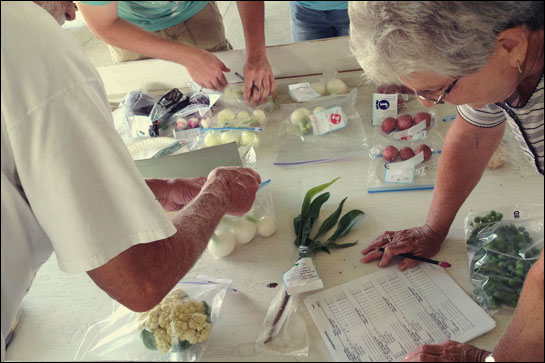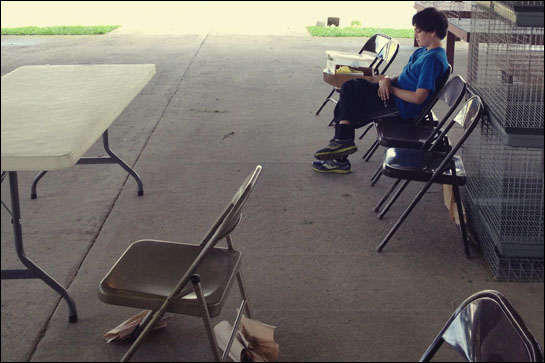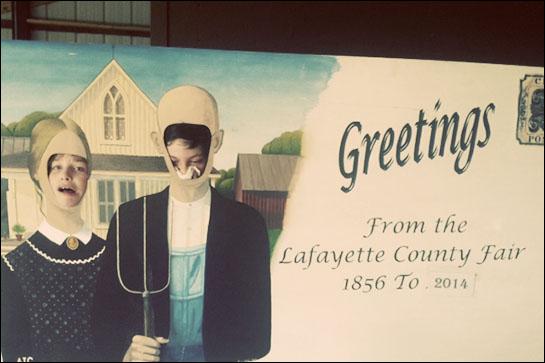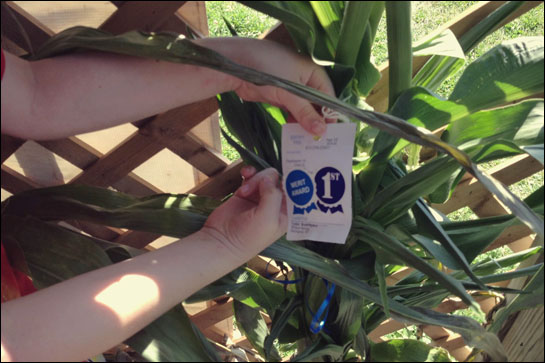What your co-workers with Aspergers wish you knew

The first year we lived on the farm, my son showed pigs. He did okay (and I got one of my favorite posts of all time). But he realized that the county fair is not about pigs, it’s about social skills. You have to be able to guess what traits of a pig the judges will like this year, which requires talking to neighbors and pig feed sales guys who come by the farm. It’s a networking thing: “How’s the weather? How are hogs this year?”
Even crops can be subjective. Should beans be more green or more consistently shaped? Should the cauliflower be presented with or without leaves? The judges change each year and you have to know who you’re dealing with.
The other thing you need to do to win at the county fair is to make eye contact with the judges. Or even chat them up. It’s ironic since a crazy percentage of farmers have autism (think about it: great at logistics and no need to talk with people during the day.) So it’s the kids with great social skills who win at the county fair.
My son figured that out fast and didn’t want to show pigs the next year.
Lesson: We know we have bad social skills. You won’t offend us by saying you know too, just help us to not have to use them.
Instead my son entered the crops part of the fair. He entered his sweet corn. (In the country you say sweet corn so people know you are not talking about feed corn. In fact, so few people grow sweet corn that if it’s feed corn you say just “corn”.)
It was a long wait for the judges to pick a winner among 50 stalks of corn that pretty much all looked the same because the July fair is too early for corn.

Then he had a revelation: he had already made money selling corn, and he was having a hard time seeing why it would be better to show corn at the fair than sell corn at the gas station. (In the city, farmers markets look like a rural gathering. In the country, farmers markets look like a trip to the store.)
He got a blue ribbon.
He announced on the way home that this was the last year of the county fair. Then he said, “Hey, now I can advertise that I have blue-ribbon corn! I can charge more money!”
Lesson: We understand money because it’s black and white and it’s a game with clear rules, no nuance.
The third year of the county fair my son only wanted to go on the rides. This is disturbing to me because I am sure they are unsafe. But I tell myself it’s more dangerous to cross the street so next time I’m in NYC I can have the kids cross one less street for each ride they go on and it’ll be a statistical wash.
The fair has too many people for my son. When he was younger he could bring a chew toy to alleviate stress. Sort of like when an adult bites their nails, but people with autism are biting their nails all the time so there are no nails so they need a substitute.
But since he knows a chew toy is not socially acceptable, he started bringing a book to read. Which is fine for restaurants and intermission at the symphony, but not okay at the county fair. He knows that.
So he was picking his nose.
We have picking rules. No picking if there’s puss. No picking where people can see scars. And no picking if there is blood. I relent on the blood because picking is not that interesting if there is no blood. I think it’s not so much the blood as the sharp pain. It’s a way to focus.
I realize this cutting talk is not socially acceptable. And I convey to my son that most people I know with autism do some sort of socially unacceptable picking, but you can’t really talk about it. Just do it if you need to calm yourself. He understands it’s a fine line between picking enough to stay off OCD medicine and being so OCD that you have to have medicine. We are trying to walk that line.
But it’s super stressful at the fair: Lots of people. Sweat. Noise. Flashing lights. I said, “Your nose is bleeding. Go to the bathroom and get a paper towel.”
He does that. I see him get in a few more picks on his way there.
At the cotton candy stand there was a placard for taking pictures. I tell the kids we can’t pass this up.
I point the camera at the placard and this is what I get:

I show my son and first he says, “Mom! Delete that!” Then we both can’t stop laughing and he says, “Okay. You can keep it.”
Lesson: We have to do some self-soothing in public. We are trying our best to do what’s most socially acceptable even though we know none of it really is.
When my son and I travel, we stay in a hotel. Inside the hotel almost the whole time. The hotel is nice because there is none of our stuff there. It’s empty. No distractions, and nothing that requires transition. Our experience of life is gearing up for transition and recuperating from transition. Vacation is a vacation from transitions.
I have a rule that we have to leave the hotel once a day because people with autism get more flexible in their routines if they take small steps. In Hermosa we went to the beach, in Beverly Hills we did lunch, in Seattle we went to the Chihuly exhibit.
He complained, of course, but I told him to shut up because I hate leaving our room as well. I told him if I complained as much as he did no one would talk to me. I didn’t tell him if he wants to complain he should get a blog. I didn’t tell him I get paid to complain. He can learn all that later. (Although actually, he is learning the ropes of the post on his own.)
In the exhibit we were so happy. It was dark and quiet and nothing moved. I told my son we need a picture because we were having such a good time.
He says, “okay, how about this?” and climbs up a wall next to a sign that says DON’T CLIMB. Then he makes his standard get-me-out-of-here pose.

Lesson: When we are being funny, it means we are happy. Even if the joke’s inappropriate. We’re still trying.


Re: You won’t offend us by saying you know too, just help us to not have to use them.
It would be helpful for the rest of us if you would self-identify.
Right now I’m in South America, and my Spanish is really bad. At the beginning of practically every conversation I say (in Spanish): “sorry, but my Spanish is not good.” As result people generally smile and show patience with me.
Maybe I’m off-base, but this seems like a big ask for someone with Asperger’s. One of the hallmarks of the condition is that you have a hard time relating to people, so it might not even occur to you that self-identifying would smooth the way. Or perhaps you also realize that self-identifying to strangers only stresses them out more because the condition is so poorly understood.
As a neurotypical, I feel like it’s up to me to be patient during strange social interactions and to set clear boundaries (with as little rancor as possible) with those around me.
I agree. I was diagnosed with PDD-NOS at 55, my son with PDD-NOS at four and Asperger’s at age seven. Trying to explain it to the average person is like spitting in the wind. Even if you bring an article that clearly explains the issue, many people think you are making excuses; they just don’t get it. Somehow it does not seem right that the person with the difference must be the one to guide those that believe they are “normal”.
Melissa’s right — I generally do not self-identify because it’s risky to do so with people who do not understand you or the condition well.
Best case scenario, they are lovely and understanding. Worst case scenario, you are immediately categorized as some kind of defective and it is really hard to recover from that.
Most of us are trying to pass as normal, just like everyone else is in pursuit of normal. There are a lot worse problems a person could have and frankly we enjoy the company of other Aspies so life is really great when we can shake off the neurotypicals.
Pardon my ignorance, but can’t social skills be learned?
Babies learn social skills from the moment their born. And humans have a natural ability to learn social skills just from watching.
Aspergers is a disorder where you have to be verbally told the social skills before you can learn them. Also part of learning social skills is generalizing small rules — like, if you smile when you say hi to your mother then you smile when you say hi to anyone you like. Someone with Aspergers cannot generalize, so they need to be told, smiling at your mom is not enough. You should smile at other people if you want them to feel warmth from your greeting.
If we could successfully teach people with Aspergers what other people learn by osmosis then the disorder would not be so difficult, but we don’t know at this point how to verbally teach social skills with a lot of success.
Penelope
I was growing up before aspergers became an official diagnosis (still haven’t been diagnosed as an adult) and remember my mother having to constantly remind me to maintain eye contact when talking to people. It’s something that I really had to train myself to do (among other things) growing up. Now it’s something that no longer requires a lot of thought or effort, but I had to be coached in a lot of basic social skills.
Over the years I have worked on my social skills. I’ve found it harder when in a situation that is too stimulating such as crowded places or when it is noisy. I’ve learnt to be aware of what is actually leading to the stress and try to control it. In a smaller conversation such as one to ones I can be very empathetic and socially skilled. But this has taken years of work.
They can be learned but I learned most of mine by rote. I have Aspergers and when confronted with a “typical” social nicety I have to think of every other similar situation I have ever been in and what worked or didn’t and choose how to proceed. What a neurotypical person would know almost instinctively I have to run through step by step which is not only exhausting and stressful, it’s time consuming. On the outside it makes me look distant or even snotty when on the inside it’s a whirlwind of anxiety and desperation to get the “correct” response. That’s on a good day. On a bad one I’m lucky if I can string all the right words together to say good morning to the neighbors without a panic attack. So to finally answer your question, yes social skills can be learned but for most of us it’s a mask that takes an incredible amount of time and energy to use effectively and when that energy is gone you still have to deal with the whole person but now she’s cranky and tired from holding on to the mask.
Adult survivors of child abuse & social isolation have similar socialization problems. Teaching social cues and responses on the Internet is wonderful for so many people. Thank you.
As an adult Aspie I have had to learned coping skills like having scripts for various things. It helps but I still make mistakes. I think the biggest difference is that “normal” ” feel” while we have to “act as if” we feel.
What you pick up on naturally is something that I must learn by rote. If I have a job interview, on top of all the other pressures, I must keep track of how long I look at (actually around) the interviewer, then I must count while I glance away (can’t stare) and then I look back. This “dance” goes on during the entire process. Imagine your entire social life having to be handled the same way.
I think your son is very lucky to be able to learn from you.
You don’t have to look others directly in the eyes to look like you are making eye contact.
You can look at someone’s nose, mouth, or cheeks and you still appear to be making eye contact. Teach that trick to Yefet.
That is a good trick if you are listening to someone. But if you are communicating through eye contact — like at a bar, or in a pig show — then you need to actually look at the person’s eyes to read what they are telling you.
Interesting tidbit: one of the reasons dogs are so good at communicating with people is because both dogs and people can look into each others’ eyes and communicate without talking.
Penelope
Seems like I read somewhere that both people and dogs will focus first on one eye, then the other–back and forth, repeatedly– when listening & communicating through eye contact. I’ve found this to be true in my experience, both with dogs and people. It’s one of the ways you “just know” that someone is really paying close attention to you, instead of just pretending. The “hard stare” that some moms and teachers (and dogs?) use to express authority and disapproval does not usually switch focus between eyes.
Learning the unspoken rules of a culture is fascinating, but I imagine it can get exhausting if even your own culture feels foreign.
You really capture the intimacy well in your writing. Thanks for that. Both your son and your personalities,though it may be difficult, made me laugh. And of course your strong bond made me smile. Though you may be used to these kind of responses I thought I’d share it anyway :)
I really appreciate your comment. Thanks. I didn’t realize how intimate the post was until I read the comments. I am happy to have that intimacy- I have to work so hard to be close to people. To me, your comment is like getting a blue ribbon :)
Penelope
Penny,
My 12 yr old son is also on the spectrum – he’s # 5 of 6 and half of a twin. We gently discourage him from repetitive behaviors, and have lots of help to do so (well educated siblings make great peer models and diligent observers:). But we – like you – recognize that the best that we can do most times is to steer his stimming.
One thing that works well for us is to let him manipulate twisty ties (you know the wire bag ties from loaves of bread). Actually, he came up with this, and has gotten so good that he makes 3D figures out of them while studying, standing outdoors, and in all kinds of situations. I wish I could show you some of his creations. At any point in time, he has a pocket of them, usually filched from the produce section of our favorite supermarket. Anyway, perhaps your son would benefit from an innocuous form of stimming? I know that every kid is different, but the motivations are the same and this is pretty cool actually. My boy taught a Sunday school class how to do it, and was a cool kid for once – what a boost to his confidence!
Just my 2 cents worth,
Dale
Action figures like this? http://www.booooooom.com/2014/10/12/kid-money-makes-action-figures-twist-ties/
Yes Caro, his stuff is exactly like those figures except he tends to make cartoon figures and game characters like Mario, etc. He also does trains and did winter and summer Olympics scenes. Anything that stands out and catches his attention.
I figured out a couple years ago that if I explain to my youngest son (now 16, with Asperger’s, probably on the mild end) how to behave in public as if they were step-by-step instructions, he can just do it. And he internalizes those steps and can repeat them later, sometimes even in a slightly different context. It’s like he’s taking his steps and saying, “I wonder if they will work here.”
I used to ride him on caring about the impact he has on others or being polite or other things that were statements of values, but all of that just made him shrug his shoulders and bite the skin under his nails more.
I love to see him figure this stuff out based on the “if you encounter this situation, here are the things you do so that you get a positive response that works in your favor” stuff I tell him.
It has also markedly improved my own social skills. I’m just introverted and like very muc to keep to myself in public, but I’ve developed some standard behaviors that I just apply in given situations, and I’ve noticed that I build rapport easier and seem to be better liked. Score.
I like that Yefet got a blue ribbon. He beat the odds. He must be growing some really good sweet corn.
This post is really lovely.
Many kids and people without Aspergers experience these things as well (calm rooms, complaining kids, sensitivity, wanting to be alone) Maybe not as intensely, but they do. So, all I’m saying is, don’t give yourselves TOO much of hard a time :)
kids and people. My typing is atrocious today.
I just assume most people type in their phones. It’s hard to get all the words right.
I’m an engineer and have worked with several people with Asperger’s. I think engineering is a really great profession for people with Asperger’s because people expect engineers to be socially awkward. I’m socially awkward myself although I don’t have Asperger’s. I hope you continue to expose your son to math and science even if you are homeschooling and not great at these subjects because this could be a great career opportunity for him.
Hello. My son wants to be an Engineer. He is 14 and very good in math and science. But with his social skills it’s hard for me to imagine him driving, and going to college. Have your Asperger’s friends that are Engineers told you how they got their education to be Engineers?
Many of your posts help me understand my young son better.
How do you teach them compassion and how to empathize with how others feel?
I’m don’t mean to sound like an ass. This is all very new to me. I am just starting to learn about it. I don’t really know where to start.
I think that aspergers is not the lack of compassion but they tend to be so logical that in some way they don’t see why people are so sad or torn up about something.
When people tell me about their dogs dying I crinkle my brows and say “awe I’m sorry!” But I seriously don’t care. It feels so fake and wrong of me. I really don’t care for that kind of thing. But I know it’s the right thing to say.
When women cry about their boyfriends cheating or being crappy I do the same thing and offer condolences but I can’t feel their pain because I think they choose their situation (most of the time).
So I think that you have to teach them socially acceptable reactions but you don’t have to teach compassion because it’s not like they lack it.
This is so true Karelys.
Maria, it isn’t that people with aspergers lack empathy, it is that they express empathy differently and take much longer to process the information internally. Sometimes their chosen responses can seem heartless, but it really is their way of trying to be helpful.
In depth explanations, modeling appropriate behaviors, and teaching social cues and simple worded responses can go a long way and should be used as tools to help a child with aspergers learn to function in a world with neurotypical adults.
Karelys — “but you don’t have to teach compassion because it’s not like they lack it.”
Well, in your case, apparently you do!
If you don’t feel anything when someone else is distraught about the loss of someone they love then you lack empathy and compassion. Perhaps you have a narcissism issue as well.
My son is eight and the only child. After years of testing for various things (adhd, non-verbal, etc) we are just figuring out he has aspergers. My husband and I are super social, so my son would often get punished for things that we assumed was a form of disrespectful behavior. I feel terrible because between school and home he has really had a tough time. Your post really helped me understand him more. Often aspie sites will give checklists about behaviors, but you put some of the characteristics in a context I can truly understand. Please post more. Please offer a course or something. I would pay you to coach me in this area. I really appreciate the clear insight.
You need to find a therapist near your home.
Try to be more emotionally present with your child. Because you and your husband are a certain way, doesn’t mean your child should be that way too- he is his own person.
Instead of looking at your son as if he has a problem and constantly trying to ‘fix’ him, try looking into how you are treating him and what you are saying to him. It takes a lot of reflection, but if your kid is young it could be his environment and possibly projecting causing a lot of the problem.
Good luck. I hope things get better for you all.
“But I tell myself it’s more dangerous to cross the street so next time I’m in NYC I can have the kids cross one less street for each ride they go on and it’ll be a statistical wash.”
Bahaha! I play that statistics game when I really don’t want to get into a fight with my kid because anger and frustration are so debilitating to me. I end up feeling like how people feel when they’re extremely dehydrated or when their blood sugar levels crash. So I try to minimize those situations. And I have to do a lot of mental acrobatics and decide that it’s a statistical wash in some situations so I feel better about it.
It just makes me laugh to find someone else that does the same thing.
I think a lot of people do but they just don’t freely admit to it.
I want to say thank you for posting this so much. I was diagnosed as being on the spectrum a couple of years ago, and your posts have been helpful to share with work, friends, others to say “hey this is me! Look what she’s saying, that’s what I need.” And this post, I’m sharing it with people now to say “Hey, seriously this is me! These things, remember them when talking to me. Please”
The title is very misleading. It’s more about raising a kid with aspergers then anything else.
No it isn’t misleading. These are the same things that I experience that I wish my coworkers/classmates/friends/whomever I know, knew, just to understand me a little bit better and why I do the things that I do.
Having to try to learn the “unwritten” rules and navigate social situations is physically exhausting. I do not have Aspergers, but I am INTJ and am physically drained after being in social situations. My daughter has ADHD and she has a hard time with the unwritten social rules, too.
I think this post will certainly help someone I know very well, am forwarding it to him ASAP.
Really moving post. I think I understand aspergers a little better now.